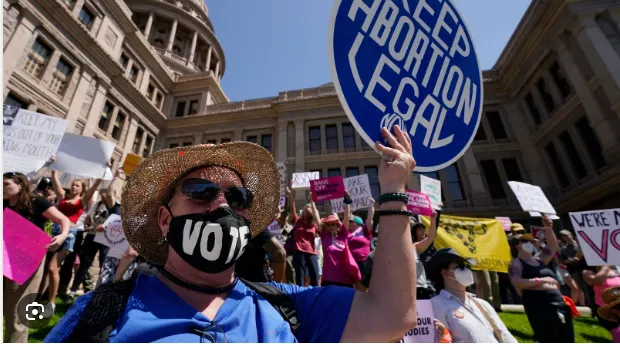The Texas Supreme Court ruled against Kate Cox, 31, in her plea for an emergency abortion within the state. Despite acknowledging the complexity of Cox’s pregnancy, especially due to the severe diagnosis of trisomy 18 in the unborn child, the judges highlighted that while certain pregnancy complications are severe, they may not inherently pose heightened risks to the mother, as required by the exception.

Cox’s doctor, seeking pre-authorization for the abortion, did not attest to the court that Cox’s condition met the necessary criteria for the exception.
Texas Supreme Court Rejects Woman’s Plea for Emergency Abortion Care”
On Monday, the Texas Supreme Court delivered a ruling against Kate Cox, represented by the Center for Reproductive Rights (CRR), who sought an emergency abortion within the state. Earlier reports indicated Cox’s intention to seek care outside Texas.
This decision followed the Supreme Court’s temporary halt to a lower court’s ruling last Friday, pending further consideration of the case. Texas Attorney General Ken Paxton had urged the high court to reverse the lower court’s decision, which had granted Cox’s request for an abortion due to severe fetal anomalies.
The Texas Supreme Court, in its opinion released on Monday night, clarified that their decision should not bar any woman meeting the medical-necessity exception from obtaining an abortion without requiring a court order.
The opinion emphasized that it’s the responsibility of a doctor to determine if a pregnancy poses life-threatening conditions or risks impairing major bodily functions, not the judiciary.
Amid this legal uncertainty, Nancy Northup, President, and CEO of CRR, highlighted the distress Cox faced during this limbo, stressing its impact on her health. Northup emphasized the dangers of abortion bans, citing Cox’s urgent need for care and recovery surrounded by family.
Court Rejects Woman’s Lawsuit for Emergency Abortion.
Although Cox is seeking care outside Texas, her representatives intend to continue pursuing the case, citing its potential recurrence and the need for review.
Cox has received offers for abortion access from other states and countries, but her current location for the procedure remains undisclosed.
Cox’s lawsuit detailed the diagnosis of full trisomy 18 in her baby, a condition associated with high risks of miscarriage or stillbirth and low survival rates. Her medical history, including previous cesarean deliveries, underlines the risks associated with continuing the pregnancy, including the possibility of severe complications.
The ongoing legal battle in Texas occurs within a landscape of stringent abortion bans, with limited services available in the aftermath of the U.S. Supreme Court’s decision overturning Roe v. Wade.
Despite exceptions for medical emergencies and fatal fetal diagnoses, challenges persist regarding access to care and the legal clarity surrounding these exceptions.
Challenges to Texas laws also encompass confusion surrounding exceptions to bans, with severe penalties, including life imprisonment, against doctors aiding abortions.
Attorney General Paxton’s office argued against Cox’s claims, stating that fertility risks or fatal fetal abnormalities might not meet the criteria for life-threatening conditions under Texas law.